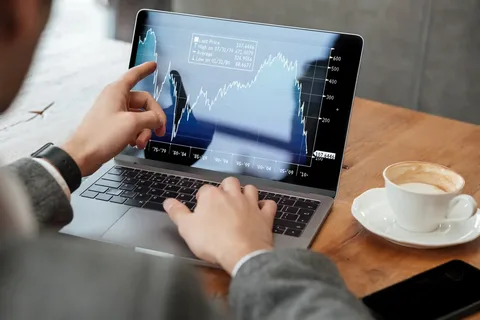Forex for Beginners: What You Need to Know Before Trading
Forex trading can be transacted by buying one currency and selling another. It is a two-person game, like EUR/USD, in which you must predict how the first currency will fare against the second. An immense market constantly trades on weekdays in different time zones worldwide.
In the same respect, it is important for any novice in trading to understand that forex trading is not just gambling. It is, therefore, about price fluctuation, currency power, and the factors that influence these fluctuations. Some might find this slightly paradoxical, but one can realize how the forex system works as time progresses.
How the Forex Market Operates
Forex operates differently from the stock market as it is not central. However, it is executed online through various banks, brokers, and institutions and can be accessed globally. Such a structure provides an available market throughout the day as it doesn’t have a centralized market.

This makes the market dynamic since it changes with time and responds to events worldwide, financial information, and even politics. It will be useful to know the hours of operation of the major centres, specifically New York, London, and Tokyo, so that you can determine the time best suited for trading with a lot of fluidity.
Major Currency Pairs to Watch
This means every currency pair cannot be the same or traded similarly. The most popular ones include EUR/USD, GBP/USD, and USD/JPY, which have the smallest spreads. Some pairs normally offer relatively better price movements, reducing the likelihood of high risk for newcomers.
Trading on major currencies prevents the volatility accompanying most other discontinued currency pairs, also known as exotic pairs. Besides, all these mainstream pairs are not very difficult to analyze, and there is a lot of information and resources available to help you make the right decisions while trading.
Forex Trading Account Setup
To begin with forex trading, you will first have to deal with a reliable broker, and to do this, you will need to open an account. The real one includes providing identification documents, choosing the account types, and choosing the platform, MetaTrader 4 or MetaTrader 5, as the main choices.
Numerous brokers provide such services and allow traders to practice using fake money. This is advantageous as it enables one to understand how the industry expects compounders and the signals it sends before investing. A reliable broker provides transparent trading specifications, short commencement rates of buying and selling, and training aids for the trader.
Leverage and Margin Explained
In another respect, Forex trading is characterized by leverage. It enables traders to increase their account balance to numerous times the number of lots they can trade. For example, a 50:1 means that the trader can trade $50,000 of the value with the $1000 he or she possesses.
However, leverage cuts both ways. It may make big profits and losses possible in equal measure. Newcomers seem eager and reckless. They should learn and know their form of margin and should not engage in high leverage without a proper trade plan.
Understanding Spreads and Pips
In Forex, the spread can be defined as the distance between the selling and buying prices of a stated foreign currency pair. Brokers hope to profit from this small difference, which may fluctuate depending on certain pairs and the market overall.
Their meaning: Pips, also known as the “percentage in points,” are used to measure the smallest point change within a certain currency pairing. Calculating pips is important since it will help you manage your profits and losses. This is one of the fundamental skills that the beginner in the forex market has to learn right from the start.
The Importance of a Trading Plan
A trading plan is a compass that guides a trader in the world of Forex. It includes the time of trading, the basis for entering and exiting the market, risk, and the expected number of trades. You can land on all fours or stumble around blindly; in other words, without thinking, you tend to act on passion, so to speak.
Developing a great plan does not need to become perfect – it only has to be the perfect plan against which to compare your work in progress and the next step to take to improve the overall quality. Pick the amount you are willing to bring at the risk per trade and the signals on which you will rely. Alternatively, keeping a trading journal is very beneficial. It helps to see how you are getting along, at what points you may cause a loss of efficiency, and how to avoid that.
Risk Management Techniques
As bright as you may be in your strategy formulation, applying risk management is best. Other protective measures, such as placing stop loss orders, should also be implemented to enhance capital protection in the long run by setting risk percentages for each trade made.
In trading, there ought to always be a limit to the amount of loss incurred in the market. Another highlighted virtue includes discipline, which ensures one stays focused and does not quit before gaining the much-needed experience. Of course, even if the losses are small, it is better to lose them when trading but not blow up the account in one trade.
Technical Analysis vs. Fundamental Analysis
Two types of analysis are used when trading in the Forex market. Technical analysis relies on analyzing the price movement of financial instruments in an attempt to predict future price movements. It’s suitable for short-term developments and timing market entries.
On the other hand, fundamental analysis is based on the economic and political factors that influence the economy. The federal funds rate, Gross Domestic Product, or job rates are among other indicators that can lead to a price shift. Understanding both kinds of research for a broad market perspective is always helpful.
Common Trading Strategies for Beginners
As mentioned earlier, there are many approaches to trading that beginners can begin with. Day trading focuses on opening and closing a position within a day, while swing trades focus on trends over several days. However, scalping entails a higher frequency of making small profits from narrow ranges or fluctuations within a particular price level.
In any case, the secret is to be consistent. Treat one approach as a trial for some time before switching to the subsequent one. The key point is to backtest, evaluate, and optimize your strategies according to the way you are and your current schedule.
Avoiding Emotional Trading
However, being emotional is the worst thing any trader can ever be, which is why they have been noted as the biggest threat to trading success. It is well-known that people act out of fear, greed, and frustration. Many entrants to the trading market leave their system after a few losses, and it gets even worse when they make their decisions hastily.
It’s important to stay objective. For example, you have requirements for yourself, such as allowing yourself to not perform with a certain result or breaking some rule, whether that performance was good or bad. This way, you will stick to a plan and be more logical than emotional; thus, mental fatigue won’t drain you.
The Role of Economic Indicators
Most currency values tend to either gain or decline significantly due to changes in some economic indicators. This is true because factors including interest rates, unemployment rates, inflation, and those made by some central banks can trigger a significant shift in forex pairs. It also helps not to be surprised when the reports are available to access or when they have been published in the market.
Any person who is either new or slightly involved in buying ingredients for cooking or wholesale and retailing should use an economic calendar. It exhibits other planned events that might potentially affect currencies’ markets. Such information helps you learn about planned events that can touch currency markets. The basic minimum is that you should not trade news because even if you don’t use sources of information, knowing the news can help you avoid unexpected events in the market.
Practicing with Demo Accounts
Entering real money into the equation to better understand how the platform works and iron out techniques would be very helpful to minimize risk. These accounts reflect actual market situations with virtual money being used in them.
Demo trading is a good way to practice with no risk involved, allowing the trader to be familiar with the terminal and some of the strategies to be used in trading. This gives you the leeway to try out something, make a mistake when conducting a trade, and observe the consequences without losing much money. Trading Forex for the first time does not pose much difficulty when one has prior experience that has been practised.
Choosing the Right Broker Matters
Choosing the right broker is even more crucial than most inexperienced persons would care to imagine. Attached, find an online broker that is licensed by proper financial bodies, comes with reasonable charge, and possesses effective customer service.
You need to know that your broker provides a qualified, easy-to-use trading platform, valuable information, and fast order opening. Thus, ensure you go through the reviews, practice in the demo accounts, and assess the fee charges to have adequate knowledge before depositing your money.
Conclusion
When just starting to trade currencies, general knowledge of Forex and basic rules are critical to focus on. It should not be viewed as a get-rich-quick scheme but rather a journey of toilsome learning, self-discipline and creating strategies to make the right decisions. Savvy knowledge about the market, risk control and management, and positive emotions are important aspects of trading mastery.
The modality is in learning, going to a practising field, and gradually developing confidence in performing the trades. However, they have to understand that it is a good tool to help them develop their financial status before they start trading Forex. The best course of action is to allow learning to dictate what comes next regarding outcomes.



